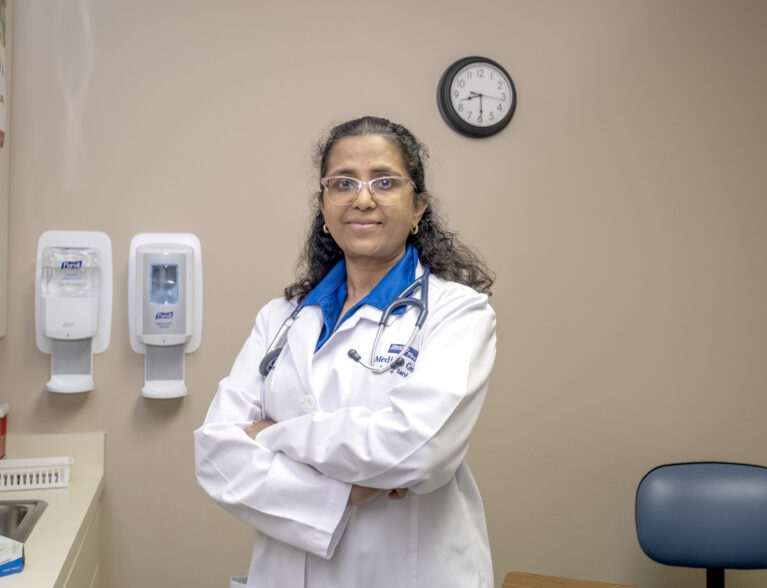
Most people are familiar with the need to prepare your home so that you can age safely in place, but have you considered the importance of preparing yourself physically, as well?
Since 77 percent of Americans over the age of 50 want to remain in their own residence for as long as possible, it’s never too early to begin a proactive approach to ensure you’ll be fit enough to live at home longer.
Visalakshi Srinivasan (known as Dr. Visa) is board-certified in geriatrics and internal medicine and is affiliated with Health First’s Holmes Regional Medical Center in Melbourne. She says one of the first things you should do is get moving – in more ways than one.
“Your gait speed measures your brain speed,” she says.
Your gait is your pattern of walking, including speed. When you walk, your muscles balance and coordinate your movement. About 15 percent of people experience a gait abnormality by age 60 and more than 80 percent of those over age 85 have a gait abnormality.
Complications of gait abnormalities include increased risk of falls, muscle weakness, sudden inability to walk, pain, and reduction in ability to maintain independence.
Dr. Visa recommends her patients do at least 30 minutes of exercise a day, including walking, with bursts of speed included. Other suggested ways to ratchet up your gait speed include:
- Change walking direction – Move sideways, backward, as well as forward stepping.
- Practice while holding items.
- Increase coordination by walking to the beat of music.
- Improve agility with walking in circular patterns in both directions.
Finding fun physical activities to do with family members not only keeps you engaged socially, but also can provide aerobic exercise, Dr. Visa says. “Play tag, hide and seek, catch – even if it’s only for 10 minutes. Doing things you enjoy, such as gardening, helps decrease stress, which in turn helps you cognitively.”
The National Institute on Aging (NIA) endorses participating in social and other activities to support healthy aging. NIA is the primary federal agency supporting and conducting research on Alzheimer’s disease and related dementias and it has found that older adults with an active lifestyle:
- Are less likely to develop certain diseases. Participating in hobbies and other social activities may lower risk for developing dementia, heart disease, stroke and some types of cancer.
- Have a longer lifespan.
- Are happier and less depressed.
- Are better prepared to cope.
- May be able to improve their thinking abilities.
By extension, active older adults are more likely to live in their homes longer and more happily than less active peers.
Several of the NIA tips will help increase your confidence, which Dr. Visa says is important.
“Typically, people with a lack of confidence spend more time in the hospital. They are more inclined to fall, and that fear of falling, in itself, becomes a major risk factor.”
One of the most preventable conditions that people often overlook is vision change or impairment, she says. Regular eye exams will indicate whether you need a new prescription for your glasses or have developed an eye or vision problem that could impair independent living.
“Eating and drinking habits can change, too, particularly if someone is alone,” Dr. Visa says. “If you have a drink or two in the evening because you’re lonely, it can cause you to fall, particularly if there is an interaction with medication. And if you’re no longer cooking healthy meals and are consuming food with little nutritional value,” you can develop a wide range of diet-related health problems.
WebMD states that while malnutrition is harmful at any age, it impacts older adults especially hard; when an older adult is malnourished, he or she is more vulnerable to increased risk of falling, slower recovery times, hospitalizations, re-hospitalizations, and possibly death.
Along with poor diet, dental or chewing problems can contribute to improper eating.
Meanwhile, the National Institute on Alcohol Abuse and Alcoholism says approximately 20 percent of adults aged 60-64, and about 10 percent over age 65, report binge drinking – which doesn’t lend itself to long term independence.
Besides eating well, drinking in moderation, socializing and being physically active, Dr. Visa says safe choices such as wearing appropriate shoes (no flip-flops or high heels!) will help prevent falls that often land seniors in nursing homes.
If you have neuropathy of your feet, make sure someone inspects them regularly for infections or injuries you may not feel and that your toenails are cut by someone who knows the proper way to care for your feet.
Prioritizing your health and making good choices across the board now can help maximize your chances of being able to age in place at home in the future.
Visalakshi Srinivasan, also known as Dr. Visa, is board-certified in geriatrics and internal medicine. She is a member of Health First Aging Services. Dr. Visa earned her medical degree at Kilpauk Medical College in Chennai India, where she grew up. She completed post-graduate work in the United Kingdom and then moved to Ohio, where she completed her internship and residency at Cleveland Clinic. Dr. Visa teaches neuropsychology classes at Florida Institute of Technology. She is accepting new patients at Health First Aging Services, 3661 South Babcock St., Melbourne. The phone number is 321-434-7611.



